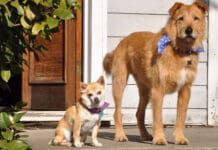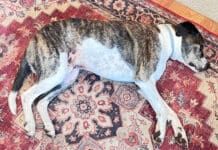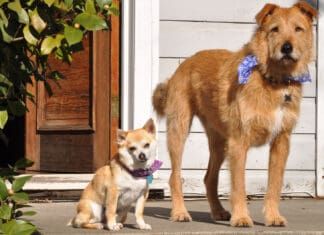I just finished reading a book about the life – and death — of a special dog, a much-loved Border Collie. Of course, I cried like a baby at the end of it, knowing how hard it is to lose such a very special dog. I have to say I haven’t cried like that in a long time, and even as I think about it now . . .
Somehow it really hit me especially hard, since the description of the dog reminded me so much of my dog DeeDee, who I still always think about. The dog in the book was independent, didn’t care much for cuddling, kept her own counsel, but always aware of her owner’s presence, whereabouts, and predicaments, and always wanted to work. DeeDee always wanted to be with me, though she, too, was not crazy about hearing sweet nothings. And when I took her to try out some sheep, she made my jaw drop; she knew exactly what she was supposed to do without having any prior experience. And yet, she wouldn’t work with the sheep and the instructor unless I was in the ring. Once I entered the ring, she was ready to get to work. When her time was up, she ran over to me with the biggest grin on her face that I had ever seen, albeit an exhausted grin! She didn’t get to work with sheep for a living, but she was a lucky dog in that she got to live on six acres with a swimming pool that she took great advantage of, other dogs that she got to harass, and enjoyed lots of games such as obedience and agility. She was also lucky in that I had the luxury of not needing to work 40-plus hours a week, loved to go running and hiking, and loved doing pretty much anything with her.
Both of these dogs were very lucky to land in the homes they did. I wonder how they would have survived if they had been adopted into a suburban or city pet home, occupants busy with work, kids, social lives. It really makes me sad when I see dogs who end up in circumstances that just don’t work for them, don’t meet any of their needs, and yet they try so hard to adapt, having no other choice. Their people try to make it work: condition, desensitize, habituate, DRI, DRO, extinguish, shape, Premack, reinforce, punish, chain, bridge, medicate, and so on. Sometimes everyone comes to a middle ground, it works to an extent, everyone continuing to work hard, yet the fit is never really right, the haunting existence of a whole different life somehow being missed. DeeDee would not have been the right fit for so many. My family was often amazed and puzzled by her level of intensity, and never would have wished for it. I loved her beyond compare.
I have seen these intense dogs become neurotic, exhibiting behaviors that are anything but normal. The behaviors come up out of necessity, as a side effect of a life not fulfilled, because they are jammed into an existence that has no way to meet their needs. I have seen it with some of the sporting breeds as well as the herding breeds. Their owners then have to try to get help for issues that percolate up because due to the mismatch. It’s not unlike kids placed in the wrong adoptive environments, the situations that have no connection to their needs. They, too, are often medicated to try to make them fit where they just don’t.
I always hope that breeders and rescues are sensitive to the results of their placements. I also hope that people searching for a dog understand that, although they had a young Brittany pup many years ago, and had the energy to tend to its needs, at a later point in their lives, it might make sense to look for a dog with less horsepower.
Tricia Breen has been involved with horses and dogs for most of her life. For the past five years, Tricia was the Director of Animal Care and Adoptions at Marin Humane Society, always keeping an eye toward helping dogs and volunteers with shelter life. She recently left this role and went back to assisting people with their dogs to build relationships, consulting with behavior and training issues. She can be reached via www.trishking.net as a new partner in this endeavor.





